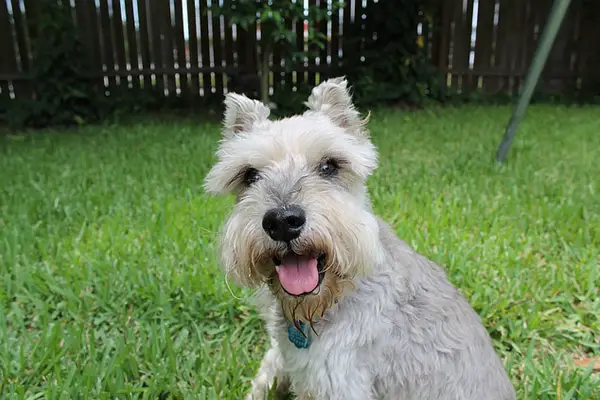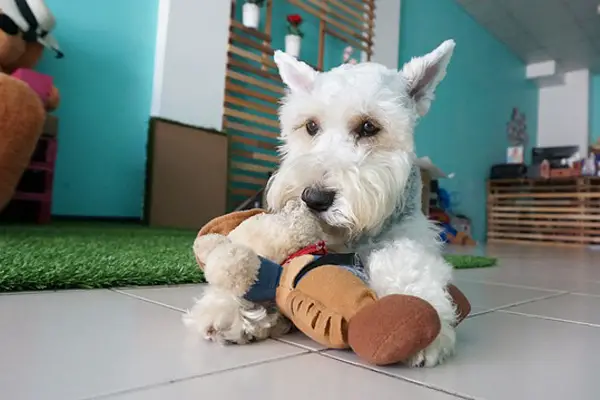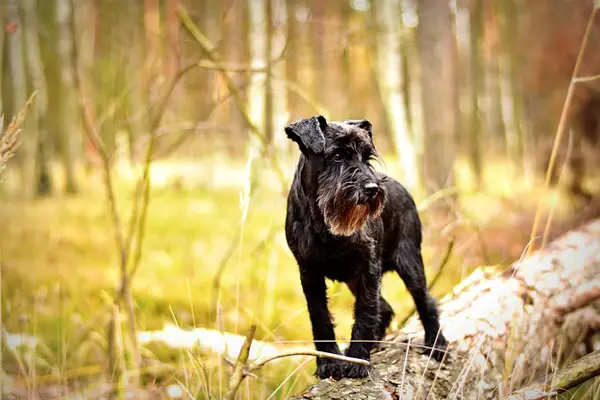Miniature Schnauzers, also called Minis, are known to be small dogs with a big heart. They are the mini versions of the Standard Schnauzers and only grow to up to 14 inches in height. They feature a bushy beard and eyebrows, which somehow gives them a human-like expression.
The Minis are known to be people-person, which is why they’re always part of the top 20 most popular dog breeds in the US. Their high energy, combined with their bright, friendly, and charming personality makes them excellent family dogs. They are even great at handling children too.
However, although they’re small, this is not a toy dog. They love activities, training, and they will make excellent watchdogs.

Miniature Schnauzer Statistics
| Dog Breed Group | Terrier Group |
| Height | 12-14 inches |
| Weight | 11-20 pounds |
| Lifespan | 12-15 years |
Miniature Schnauzer Ratings
| Energy level | |
| Exercise needs | |
| Requires attention | |
| Playfulness | |
| Trainability | |
| Shedding | |
| Grooming | |
| Friendly with family | |
| Friendly with strangers | |
| Friendly with other dogs | |
| Prey Drive |
History Of The Minature Schnauzer
Standard Schnauzers had always been the all-around farm dog since the 15th century. However, the need for ratters led German farmers to start developing miniature versions of these dogs.
So, in the mid-to-late 19th century, Miniature Schnauzers were developed by crossbreeding the Standard Schnauzers to smaller dog breeds. The Minis were then used as ratters and guard dogs on the farms.
The first Miniature Schnauzer on record was born in October 1888, and it was a female named Findel. However, it was only in 1895 when the first breed club was formed. The breed also didn’t become popular until the end of World War I, and now, its popularity just keeps growing.
By 1926, the American Kennel Club finally recognized the breed. The Miniature Schnauzer has eventually left his ratter days behind and is now considered a charming companion that keeps on winning dog shows.

Minature Schnauzer Temperament
The American Kennel Club describes this breed as friendly, smart, and obedient. However, other than that, they are incredibly energetic. Some people would love to consider them as extroverts.
Miniature Schnauzers love people, and they love being with their families. They love human contact, and they will sit on your lap or reach your neck just to show their excitement being with you. They also love cuddles, so don’t be surprised if they want to sleep beside you.
Their playful and loving nature makes them excellent dogs for families with children. They are even great with other animals, too, even with cats.
However, though they have lap dog personalities, they still have their terrier part. Which means, they love staying active – running and digging. Their alertness makes them excellent watchdogs if the need arises. You can expect them to be aloof with strangers and will watch them suspiciously throughout that person’s stay.
Despite their good behavior, Miniature Schnauzers can be stubborn, so training is necessary. And because they are already smart and obedient, this may turn out smooth. However, you need to lead with confidence and learn to manipulate him.
To make him good with strangers, you can provide him with early socialization as well. You can do this during your everyday walks so he can get accustomed to the things around him.
With the proper set of training, the Minis are adaptive in any surroundings. It won’t matter if you’re single, a couple, or a family. Just make sure to take him with you on family vacations; they are great traveling companions.
Miniature Schnauzer Care Requirements
- Nutrition: Miniature Schnauzers, just like any other dog breed, need a high-quality diet and a well-balanced diet containing protein, fiber, and carbohydrates. You should also watch out for daily calorie intake to prevent your Mini from becoming overweight. Protein should comprise the majority of your Mini’s diet. You can get this from meat, eggs, poultry, fish, legumes, and soy. Carbohydrates and fiber are next, and you can get this from plant foods, beans, and cereal grains. Stay away from wheat products as some dogs are allergic to it. You don’t want to risk your Mini’s health. You can also add fat to their diet to keep their skin and fur healthy. This also helps in improving eye function. However, be careful not to add too much fat as this can also cause some health problems. About 5% of fat should be good enough.
- Grooming: Miniature Schnauzers don’t shed a lot. However, their double coat, which is wiry on top, needs a lot of brushing. This is to prevent it from tangling or to prevent mats from forming. You can try to run your fingers through their hair to make sure that you have done enough brushing. Don’t forget to brush their legs and beard as well. He should be given a bath at least once a month. This may also depend on his activities. This is to keep his coat as clean as possible. Also, make sure to use gentle shampoo or soap. Since the Miniature Schnauzers have long hair, it would require trimming for every five to eight weeks. However, I don’t recommend doing it on your own. Instead, take him to a professional groomer. You can have his nails clipped at the same time. Don’t forget to clean the dog’s ears frequently as well to avoid any possible infection.
- Exercise: The Miniature Schnauzer is a highly active breed that requires daily exercise to maintain his optimal condition. At least 30 minutes of exercise is highly recommended – if you can do this for two to three times a day, the better. If you have a fenced yard, then this is an excellent area for the Mini to play as well. You can let him chase balls, fetch, or any other activities. You can give obedience training so he can stimulate his mind too. If you’re not in a fenced area, that’s alright, but make sure you keep him on a leash.
- Health: Miniature Schnauzers are generally healthy; however, they are more prone to certain health conditions than their larger counterparts. Some common health problems include allergies, epilepsy, diabetes, and pancreatitis. They also are prone to some common genetic issues, such as bladder stones. They are also highly prone to portosystemic shunts, a liver defect that can only be cured through surgery. Another genetic disease is called myotonia, where their muscles contract quickly, making it hard for them to get up and walk. For the genetic conditions, it’s best to check with the parents if they are affected by such conditions as well. You can also give your Mini a regular vet check-up in case some symptoms show up. Early screening will help a lot too.
- Lifespan: The life expectancy of the Miniature Schnauzer is 12-15 years.

Famous Miniature Schnauzers
- Atticus M. Finch: Took part in a 48 high peak challenge with his owner
- Dangerous Dave: Won the role of Toto in the Wizard of Oz
- Leader: The Miniature Schnauzer of Bob and Elizabeth Dole
- Findel: The first known miniature Schnauzer
Fun Facts About Miniature Schnauzers
- The Schnauze from their name is a German word for “muzzle.”
- The mustache has a purpose – to protect their face from their prey.
- The Miniature Schnauzers wire-hair keeps the dirt off. They also don’t shed a lot.
- They have excellent hearing. They can hear frequencies that are twice as high as humans.
- Miniature Schnauzers tend to bark a lot.
The post Miniature Schnauzer appeared first on Furry Friends Gear.
Miniature Schnauzer posted first on https://furryfriendsgear.blogspot.com
No comments:
Post a Comment